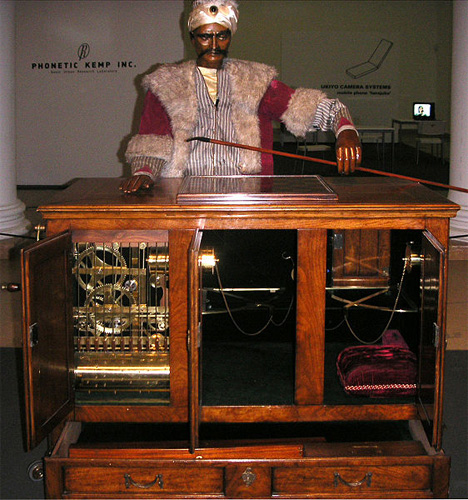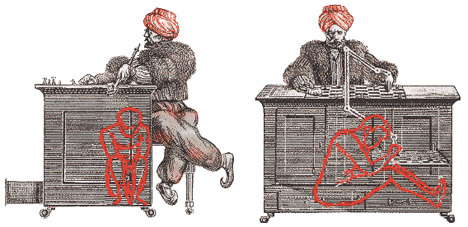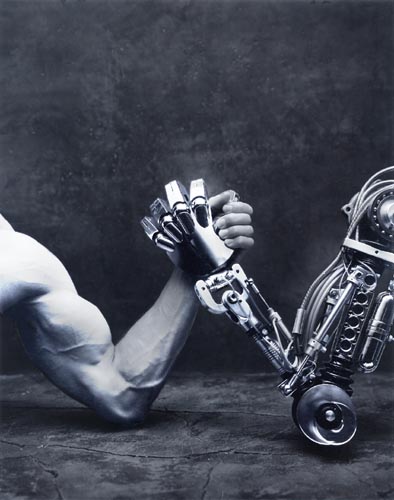Mechanical Turks - "Artificial Artificial Intelligence"
It would, in its time, change the idea of what artificial intelligence might be capable of.
The chess playing automaton, designed by Hungarian engineer and inventor Baron Wolfgang von Kempelen in 1769 to impress the Empress Maria Theresa. It was reportedly "billed as capable of beating even the strongest challengers."
Its intimidating appearance, that of an "oriental sorcerer", did much to unnerve opponents. It’s appearance, combined with the theatrics of the automaton (it would swipe the board clear, tumbling chess pieces aside, if it caught you cheating) were enough to unravel the composure of most adversaries.
Skeptics were astounded that a mechanical artificial intelligence could best them at chess matches, until it was exposed in the early 1820’s as an elaborate hoax.

"Perhaps the best technology-related hoax of all time was the Mechanical Turk, a chess-playing machine that won nearly every game it played. While it was presented as an elaborate automaton, it was later revealed to be an equally elaborate fake." Gajitz.com
Video from: YouTube.com
Apparently a small man was hidden in the inner workings of the automaton, and it was he, not some clever artificial intelligence, who had been guiding the moves of the Turk.
The intelligence was not in fact AI, but entirely human.
In modern times, the race to create artificial intelligence continues. Vast sums of money and great effort goes into creating a legitimate and verifiable "intelligent" machine. It’s man’s greatest challenge in, what some would define, our quest to become creator gods.
AI research is highly technical and specialized, deeply divided into subfields that often fail to communicate with each other.Source
General intelligence (or "strong AI") is still among the field’s long term goals.
The field was founded on the claim that a central property of humans, intelligence—the sapience of Homo sapiens—can be so precisely described that it can be simulated by a machine.
Artificial intelligence has been the subject of optimism, but has also suffered setbacks and, today, has become an essential part of the technology industry, providing the heavy lifting for many of the most difficult problems in computer science.
But for now, AI has not been achieved, and what we have so far are computers doing everyday thinking, just not for themselves. They are doing these calculations based on the parameters that we, the humans, have instructed them. The coding does no more, and no less.
However sometimes, like in the case of the Mechanical Turk, AI can be pantomimed. It can be faked, sometimes very convincingly. We humans can craft a computer program such that it will make us feel like we’re speaking with another human, or that it’s making human-like decisions.
But when you come down to it, there are many ways in which artificial intelligence, as we have achieved so far, is not up to the task. In countless instances, old-fashioned human brain power is the most reliable and accurate way to compute.
For instance:
Source
In 2005, Amazon.com launched the Amazon Mechanical Turk. The web-based software application coordinates programming tasks with human intelligence, inspired in part by the way Kempelen’s Turk operated. The program is designed to have humans perform tasks, such as color comparisons, that computers struggle with.
Katharine Mieszkowski, in an article for Salon details her foray into becoming a temporary "Mechanical Turk" for Amazon:

A picture of a woman’s pink shoe floats on my computer screen. It’s a flat, a street version of a ballet shoe. My job is to categorize the shoe based on a list of basic colors: Is it red, blue, pink, purple, white, green, yellow, multicolored? A description next to it reads “Pink Lemonade Leather.” This is not exactly a brain-busting task; I’m doing it while talking to a friend on the phone. With the mouse, I check a box marked “pink.” In the next split second, a picture of a navy blue shirt appears. I check “blue.” Assuming my answers jibe with those of at least two other people being paid to scrutinize the same pictures, I’ve just earned 4 cents.
For fees ranging from dollars to single pennies per task, workers, who cheekily call themselves “turkers,” do tasks that may be rote, like matching a color to a photograph, but they can confound a computer. Conceived to help Amazon improve its own sites, Mturk.com is now a marketplace where many companies have solicited workers to do everything from transcribing podcasts for 19 cents a minute to writing blog posts for 50 cents. Amazon takes a cut from every task performed.
Amazon claims its virtual workplace provides “artificial artificial intelligence” — a catchy way of saying human thought. “From a philosophical perspective, it’s really turning the traditional computing paradigm on its head,” says Adam Selipsky, vice president of product management and developer relations for Amazon Web Services. “Usually people get help from computers to do tasks. In this case, it is computers getting help from people to do tasks.” As Tim O’Reilly, a computer book publisher and tech industry figure, puts it on his blog, old dreams of artificial intelligence are “being replaced by this new model, in which we are creating more intelligent systems by using humans as components of the application.”
Here, there’s no ghost in the machine, no forbidding automaton - only a living, breathing, thinking human.
And though we can congratulate ourselves on ’besting’ our machine creations for now, we should also consider the consequences of allowing corporations to capitalize on vast batteries of humanity processing what could (ironically) be called ’mindless’ work. Is this where the human mind is headed? Simple button pushing and lever pulling?
While we wait for the assuredly eventual arrival of our robot overlords, there may be solace in the idea that we still can do some things better than computers. That we’re not obsolete just yet.
Yet.
By Elizabeth Leafloor, RedIceCreations.com
Source Articles:
Gajitz.com
ChessGames.com
The Turk - Wikipedia
Artificial Intelligence - Wikipedia
Salon.com
Video from: YouTube.com
























